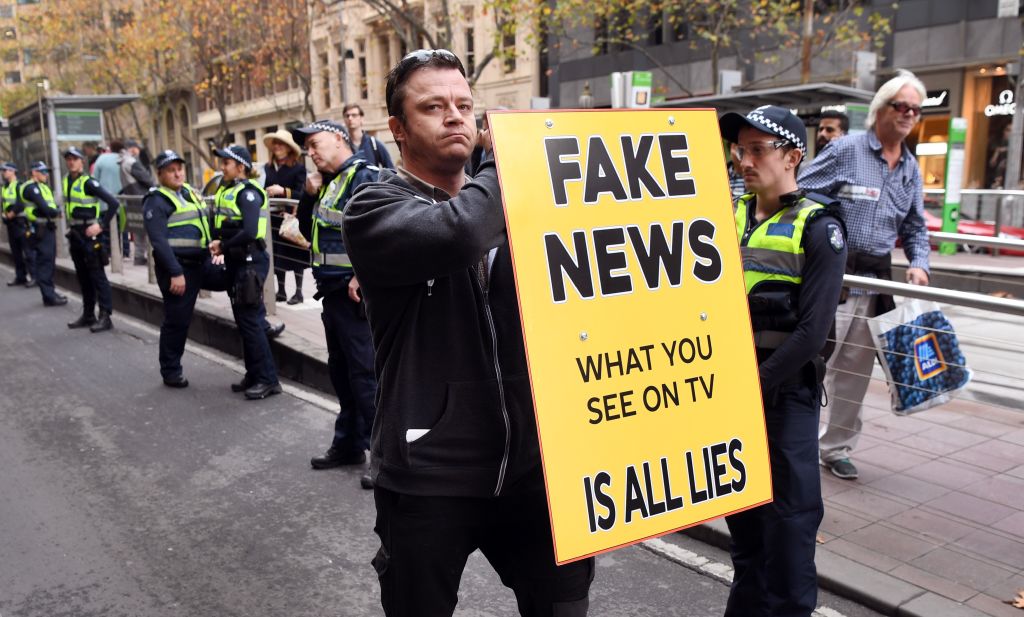The US election has, once again, be plagued by a tide of disinformation and fake news. But don’t point the finger at Russia, Iran, or China. With four days left to vote in the presidential election, American politics has become so polarised that the threat of foreign interference pales in comparison to our own domestic untruths.
For months, we’ve been battling falsehoods about the safety and security of mail-in balloting, which president Trump shares with hundreds of millions of social media followers. He has also shared tweets suggesting Osama bin Laden is not dead, and refused to disavow the QAnon conspiracy theory, which a new poll finds half of his supporters believe. Regardless of who occupies the White House in January 2021, the tide of fake news is here to stay. But if America wants to learn how to tackle the nonsense, it should take a look at its old ally.
It’s true that, in Britain, 5G conspiracy theorists have popped up during the coronavirus pandemic. And the popularity of QAnon is growing: six per cent of Brits support the movement, and a quarter believe related conspiracies, according to new research. But for the most part, British politicians are refusing to amplify these theories. And where the United States has abdicated its leadership in fighting foreign interference, Britain is attempting to fill that vacuum, sending a clearer picture to foreign adversaries like Russia about the costs of their online influence campaigns.
Take the aftermath of Russia’s attempt to poison Sergei Skripal in Salisbury. The British government quickly and resoundingly condemned the Kremlin, declassified intelligence, and released security footage to preemptively debunk the contradictory narratives the Russian disinformation machine generated. In no time at all, Britain cobbled together a coherent counter-narrative to Russian lies. Then it shored up an impressive international rebuke of the Kremlin’s illicit activity, with 28 countries expelling Russian diplomats in response to the attack.
Salisbury was one part of a larger UK Government strategy that Americans like me should envy. Britain has also attempted to build awareness among the public about their role in amplifying false or misleading content through its ‘Don’t Feed the Beast‘ campaign (one wonders if the beastie in the title role, who bemoans reading and nuance, was modelled on a prominent US politician). British civil servants, too, are being trained in how to recognise and respond to disinformation using the RESIST toolkit.
Those efforts may not seem like much, particularly after the delayed release of the Russia report, but compare them to the US response to 2016 Russian influence operations: four years and multiple investigations later, there is no consensus within the American public about what happened. Trump regularly refers to Russian influence operations as a ‘hoax’ and reportedly derails meetings whenever Russian interference is mentioned. Rather than chastising Putin for Russia’s infringement on American sovereignty, Trump has made light of ‘fake news’ and election meddling when he meets the Russian president.
The American information landscape is further complicated by declining trust in the media, fed by Trump’s relentless attacks on the fourth estate as ‘fake news’ and the ‘enemy of the people’. In 2018, the US government allocated $447m (£344m) to the Corporation for Public Broadcasting, which funds the Public Broadcasting Station and National Public Radio, as well as their local affiliates, which serve many American ‘news deserts’. In comparison, while it might not be universally popular, the BBC’s license-driven budget for the same year was over $6bn (£4.6bn). For the most part, Brits turn to the BBC when looking for a trusted news source; in a 2017 poll, 57 per cent of those surveyed said they were mostly likely to turn to the BBC for ‘news [they trusted] the most’. No other news outlet, online, in print, or on television, scored more than 11 per cent.
Yes, politics in Britain is contentious, but Brits should be proud of their successful fight against disinformation and fake news. Americans have much to learn.
Nina Jankowicz is the author of How to Lose the Information War






Comments